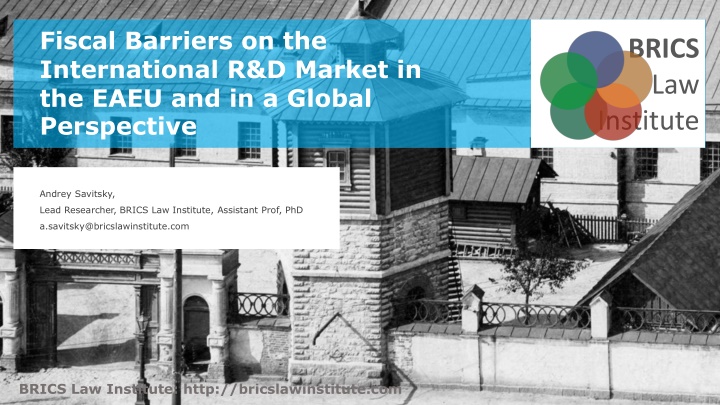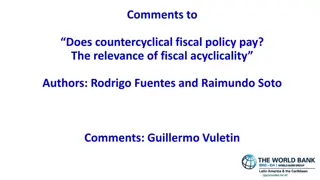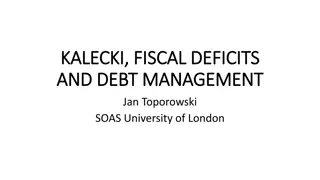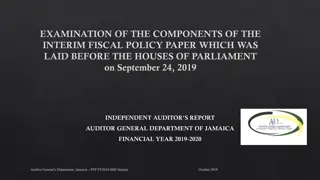Fiscal Barriers on the International R&D Market: Legal Concepts
This content delves into fiscal barriers affecting the R&D market in the EAEU and globally from a legal perspective. It explores concepts like non-tariff measures, breach of national treatment, and tax discrimination, providing insights on implications and potential impacts on international trade.
Download Presentation

Please find below an Image/Link to download the presentation.
The content on the website is provided AS IS for your information and personal use only. It may not be sold, licensed, or shared on other websites without obtaining consent from the author.If you encounter any issues during the download, it is possible that the publisher has removed the file from their server.
You are allowed to download the files provided on this website for personal or commercial use, subject to the condition that they are used lawfully. All files are the property of their respective owners.
The content on the website is provided AS IS for your information and personal use only. It may not be sold, licensed, or shared on other websites without obtaining consent from the author.
E N D
Presentation Transcript
Fiscal Barriers on the International R&D Market in the EAEU and in a Global Perspective BRICS Law Institute Andrey Savitsky, Lead Researcher, BRICS Law Institute, Assistant Prof, PhD a.savitsky@bricslawinstitute.com BRICS Law Institute: http://bricslawinstitute.com
Agenda I. Fiscal Barriers: in Search of a Legal Concept 1. Non-Tariff Measures? 2. Breach of National Treatment? 3. Breach of Fundamental Economic Freedoms? 4. Tax Discrimination? II. Fiscal Barriers on the EAEU R&D Market 1. Fiscal Barriers in the Field of Indirect Taxes 2. Fiscal Barriers in the Field of Corporate Tax 3. Fiscal Taxes in the Field of Property Taxes BRICS Law Institute: http://bricslawinstitute.com
I. Fiscal Barriers: in Search of a Legal Concept 1. Fiscal Barriers as Non-Tariff Measures? Non-tariff measures (NTM) o policy measures other than ordinary customs tariffs that can potentially have an economic effect on international trade in goods, changing quantities traded, or prices or both (Multi-Agency Support Team) the most developed concept in the International economic (trade) law widely used in the WTO and UNCTAD documents; The concept NTM refers mostly to the sphere of trade in goods, rather than in services; Basic WTO documents do not strictly prohibit application of NTMs (except for XXXVII GATT 1947); NTMs usually may take form of the other legal concepts (breach of national treatment, discrimination, etc.). BRICS Law Institute: http://bricslawinstitute.com
I. Fiscal Barriers: in Search of a Legal Concept 2. Fiscal Barriers as a Breach of National Treatment Obligation In the sphere of trade in goods art. III GATT prohibition of state protectionism (protection to domestic production art. III(1)); prohibition of discrimination of alike foreign products (art. III(2)); In the sphere of trade in services art. XVII GATS prohibition of less favorable conditions [of taxation] of foreign services or providers, modifying the conditions of competition in favor of domestic services or providers. BRICS Law Institute: http://bricslawinstitute.com
I. Fiscal Barriers: in Search of a Legal Concept 2. Fiscal Barriers as a Breach of National Treatment Obligation: the WTO DSB Case-Law Domestic alcohol beverages were treated more favorably in terms of taxation compared to foreign alike beverages: shochu, soju, pisco, Canadian beer and wine, alcohol in Armenia and Ukraine, etc.; Imposition of sales tax to foreign food products and relief for domestic alike products (Chile vs Peru); Tax incentives with respect to vehicles, produced in Brazil (Japan vs Brazil) breach of national treatment under art. III(2) GATT! BRICS Law Institute: http://bricslawinstitute.com
I. Fiscal Barriers: in Search of a Legal Concept 3. Fiscal Barriers as Breach of Fundamental Economic Freedoms EU law refers to (1) prohibition of payments with the effect equivalent to custom duties(art. 28 TFEU); (2) prohibition of custom payments of fiscal nature (art. 30); (3) prohibition of measures with the effect equivalent to quantitative restrictions (art. 34, 35); (4) prohibition of discrimination of workers on nationality (art. 45); (5) prohibition of restriction of freedom of establishment (art. 49), of free movement of services (art. 56), free movement of capital (art. 63). See the developments in the ECJ Case-Law: 24/68 Commission v. Italy; Diamantarbeiters; Co-Frutta; Bachmann; Avoir Fiscal; Biehl; Sandoz etc. BRICS Law Institute: http://bricslawinstitute.com
I. Fiscal Barriers: in Search of a Legal Concept 4. Fiscal Barriers as a Forbidden Tax Discrimination Prohibition of a nationality based discrimination in the EU (art. 18 TFEU) + own methodology of the ECJ; Prohibition of discrimination based on grounds set forth in ECoHR and ownership clause (art. 1 Protocol) + own methodology of the ECHR; Prohibition of tax discrimination based on nationality, place of a PE activities, residence of a creditor (art. 24 DTT). BRICS Law Institute: http://bricslawinstitute.com
I. Fiscal Barriers: in Search of a Legal Concept ? Which concept better fits the EAEU ? Prohibition of non-tariff measures and taxes having equal to the customs duties effect (art. 28 Treaty on EAEU); Application of national treatment to all measures in the sphere of trade in services and establishment (pp. 21-26 Protocol 16 to the Treaty); Prohibition of unjust or arbitrary discrimination or covert obstacles to trade in services; Prohibition of tax discrimination under art. 24 DTT between Member-States. BRICS Law Institute: http://bricslawinstitute.com
II. Fiscal Barriers on the R&D Market of the EAEU 1. Fiscal Barriers in the Field of Indirect Taxes Exemption from VAT of equipment, materials, designated to perform R&D, imported by the Belarussian residents (art. 96(1)(1.14) TC RB); Exemption from VAT of supply of scientific books and reviews in Kirgiz language (art. 248 TC KR); Exemption from VAT of supplies in sphere of science, performed by a [Kirgiz] non-for-profit organization* for a fee not exceeding the costs for such supplies (art. 252 TC KR); Exemption from VAT an R&D services by [Russian] educational and research organizations* (art. 149(2)(16) TC RF). BRICS Law Institute: http://bricslawinstitute.com
II. Fiscal Barriers on the R&D Market of the EAEU 2. Fiscal Barriers in the Field of Corporate Tax Belarus regards as the Belarus-sourced income any royalty or income from R&D received by a foreign organization acting without a PE(art. 146(1)(1.3) and (1.8) TC RB). Russia exempts any income of a foreign organization acting without a PE from R&D services performed in Russia from a withholding tax (art. 309(2) TC RF). BRICS Law Institute: http://bricslawinstitute.com
II. Fiscal Barriers on the R&D Market of the EAEU 3. Fiscal Barriers in the Field of Property Taxes Exemption from property and land taxes of capital facilities belonging to [Belorussian] research organization* and technology parks (art. 186(1)(1.23) TC RB); Exemption from property and land taxes of property, used in research aims by institutions founded by the only owner all-Russian public organizations of disabled persons (art. 381, 395(5) TC RF). BRICS Law Institute: http://bricslawinstitute.com
II. Fiscal Barriers on the R&D Market of the EAEU ? How to overcome the fiscal barriers ? To establish a fact of the Treaty breach by the Court of EAEU? Direct application of the Treaty by the national law enforcement bodies? Judicial protection of rights? BRICS Law Institute: http://bricslawinstitute.com























